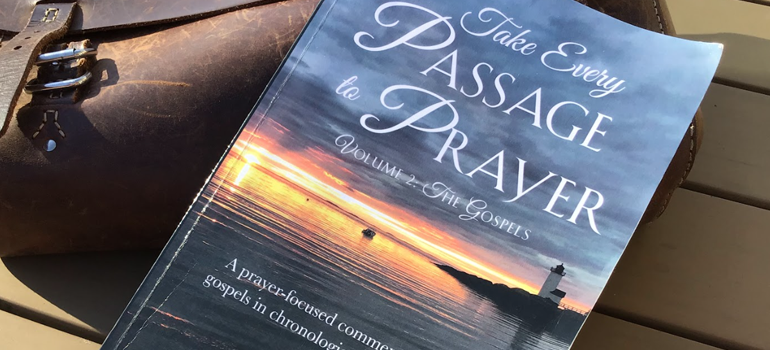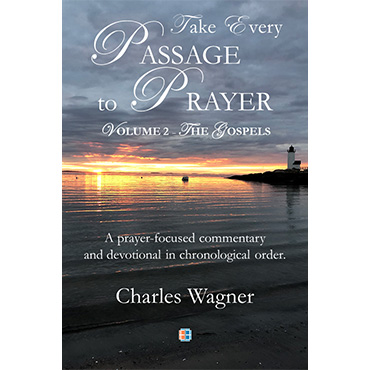The Gramazin Blog

John's Disciples Follow Jesus Instead
Take Every Passage to Prayer - Volume 2, The Gospels
Wednesday June 05, 2024
John 1:35-51
Jesus, I want to know You. I want to have a personal relationship with You, so much so that I am welcomed into Your eternal home. Who can I share the gospel with today? Who have You appointed to hear the gospel from me today? Please tell me. Please make me a rock of faith. Stable. Rooted in Christ. Unshaken by the ever-changing circumstances of life. Please “find” my loved ones and bring them to faith in Jesus Christ. Please use me as You see fit in the work of bringing salvation to those I love the most. Are there biases in my heart that prevent me from sharing the gospel with others? Please cleanse me of them. Please let it be said of me that there is no deceit in my heart. Please lead my heart to study Your Word so that You find me having devotions when You are looking for me. Amen.
Father, Your Word states that on the next day, when John is presumably once more at the Jordan River, he was in conversation with two of his own disciples. John sees Jesus passing by and he says to them, “Look, the Lamb of God!” John’s two disciples concluded that it is far better to be a disciple of the Messiah, the Son of God, than to follow a mere man, John the Baptist. The text states that the two disciples left John to follow Jesus.
The Word tells us that Jesus turned to the disciples and asked what they wanted. They responded by saying, “Rabbi, where are you staying?”
What are John’s disciples really asking Jesus?
“Jesus, we want to know You. We want to have a personal relationship with You, so much so that we are welcomed into Your own home.”
What we have here are John’s disciples doing what every other believer has done in the church age, asking Jesus to come into their life to have a personal relationship with them. Jesus doesn’t chase them away. He doesn’t hesitate. He welcomes them to come to His home and to get to know Him. This is exactly what Jesus continues to do in the 21st century. He never rejects any individual who wants to know Him (John 6:37).
Your Word records that John’s two disciples went to the home of Jesus and spent the day with Him. Andrew , who was one of John’s two disciples, was so excited about knowing Jesus that he had to tell his brother, Simon Peter. Andrew does exactly what every believer should do: he couldn’t contain his excitement about Jesus and has to tell someone he loves, such as his brother Peter. Andrew leaves the place where Jesus is staying and rushes to Simon Peter to tell him:
“We’ve found the Messiah! Follow me to meet Him!”
Simon Peter, who will become known for being rather impulsive , stopped what he was doing and followed his brother Andrew back to Jesus. Andrew essentially led his brother to faith in Jesus Christ, the first such recorded account in the gospels. After Andrew introduced Simon Peter to Jesus, Jesus gave Simon Peter a new name, Cephas. It is a prophetic name change as Jesus told the impulsive Peter, who seemed to be tossed about by the waves of life, that he will one day become a solid rock of faith (see also Matthew 16:18).
The text tells us that Jesus decided to leave the Jordan River for the region surrounding the Sea of Galilee. It is believed that Andrew and Peter came with him. Somewhere along the way, perhaps as they were leaving the baptismal site of John the Baptist, Philip had a divine appointment (encounter) with Jesus. The text says that Jesus “found” Philip and that Jesus asked Philip to “follow” Him. This is what Jesus asks of us. We are to put aside our other priorities in life and follow Jesus into ministry, touching lives for Christ by our godly character and by our acts of compassion for our neighbors in need. He became the third disciple to join Jesus. He was from the town of Bethsaida, the same town as Andrew and Peter.
Philip immediately invited Nathanael to follow Jesus by associating Old Testament prophecies about the coming Messiah with Jesus. Nathanael appears to have a bias against the people of Nazareth, where Jesus spent His youth. Nathanael doubted that there is anyone from that city who is worth following. Philip responded by encouraging Nathanael to ignore his biases against Jesus and explore if Jesus is the Son of God. What a fitting statement for the sceptics in the 21st century? Don’t make assumptions about Jesus. Investigate if He is the real Messiah.
As Nathaniel approached Jesus, Jesus complimented him, saying there is no deceit in Nathanael. Nathanael asked how Jesus knew that? Jesus said He saw Nathanael under the fig tree. The text does not explain what that means. However, the phrase “under the fig tree” was apparently a phrase used at that time to describe meditation on scripture. In short, Jesus had noticed Nathanael having his devotions. Nathanael showed his knowledge of the Old Testament prophecy by calling Jesus the Son of God and the king of Israel. Jesus said that Nathanael will witness even greater things from Jesus, such as the angels of God ascending and descending upon the Son of Man. Amen.
Footnotes
85. The timing of this exchange is not clear. We read in Matthew 4 that Jesus was led into the wilderness by the Holy Spirit after His baptism. However, Jesus is now adding His first disciples who will, presumably, remain with Jesus until His death three years later. The only time for Jesus to be alone in the wilderness for 40 days was before any disciples followed Him. Therefore, it is likely that Jesus returned to the Jordan River and the site where John the Baptist is baptizing people after His experience in the wilderness with Satan. His conversation with John’s disciples is occurring after the angels had refreshed and renewed Jesus after the intense period of temptation Jesus gained victory over.
86. In Matthew 23:7-8, Jesus ridiculed the teachers of the law and the Pharisees for wanting to be called “Rabbi”. He states that only He is the true Rabbi (Teacher). Judas Iscariot refers to Jesus as the Rabbi in Matthew 26 and Mark 14. Peter refers to Jesus as Rabbi in Mark 9 and 11. The blind man refers to Jesus as Rabbi in Mark 10. Nicodemus refers to Jesus as Rabbi in Luke 3:2. Jesus’ disciples refer to Jesus as Rabbi in John 4, John 6, John 9, and John 11. However, John the Baptist’s disciples call John “Rabbi” in John 3:26. John then instructs his disciples that he is nothing compared to Jesus.
87. Andrew is listed throughout the gospels as one of the disciples of Jesus. He witnessed the resurrection of Jesus (John 20:19-25), the Great Commission (Matthew 28:16-20), and the ascension of Jesus (Acts 1:8-9). He was born in Bethsaida (John 1:44) but lived in Capernaum with his brother, Peter (Mark 1:29). He was the son of John (John 1:42). He was a fisherman (Matthew 4:18). It was Andrew who presented the five small barley loaves and two small fish to Jesus at the feeding of the 5,000 (John 6:8). Andrew also informed Jesus that several Greeks wanted to see Him (John 12:20-22). It is believed that Andrew evangelized Greece, Asia Minor, and what we know today as Russia. A story circulated in the 7th century that Andrew was crucified on an X-shaped cross.
88. Peter was married (Matthew 8:14). He asked to walk on the water with Jesus (Matthew 14:28). He rebuked Jesus about Jesus having to die (Matthew 16:22). Peter offered to build three shelters for Jesus, Moses, and Elijah (Matthew 17:4). He told Jesus that he will never deny Jesus (Matthew 26:35). Peter fell at Jesus’ feet and told Jesus to get away from him because Peter is a sinful man (Luke 5:8). He questioned Jesus thought process when Jesus asked who in the crowd had touched Him (Luke 8:45). He challenged Jesus about washing his feet (John 13:6-8). He witnessed Jesus Transfiguration (Mark 9:2-8). He was sent ahead by Jesus to prepare a room for the Last Supper (Luke 22:8). He was with Jesus in Garden of Gethsemane (Matthew 26:36-46). Peter slashed off ear of guard (John 18:10). He denied knowing Jesus three times (Matthew 26:31-69). He was given instructions by Jesus after the resurrection (John 21:15-19). Peter was the first to jump into the water when Jesus appeared on the beach (John 21:7). He was described as one of the pillars of the Jerusalem church (Galatians 2:9, Acts 2-12). He was rescued from prison by an angel of the Lord (Acts 12:3-19). He wrote the books of 1 and 2 Peter. It is believed that the gospel of Mark was written based on the recollections of Peter’s time with Jesus. It is believed that Peter was crucified upside down by Nero, though his death is not recorded in the Bible.
89. The Syriac surname that means “rock”. The Greek translation is Petros and the Latin translation is Petrus.
90. There appears to be a “missing” disciple. We read in John 1:40 that Andrew was one of two of John the Baptist’s disciples who left John to follow Jesus. However, that unnamed disciple does not appear again in this passage. It can be deduced that he lost interest in following Jesus, returned to resume being a disciple of John the Baptist, or was present with Jesus throughout the gospel narrative but his presence was insignificant in the ministry of Jesus. However, some people believe that this “missing” disciple was none other than the Apostle John. John tended not to identity himself in his account of the gospel.
91. Philip knew scripture (John 1:45-46). He most likely spoke Greek (John 12:20-21). Jesus tested Philip regarding the feeding of the 5,000 (John 6:5-7). He asked Jesus to show him the Father (John 14:8-9). He was present at the Last Supper (Matthew 26:20). It is believed that Philip preached in the region of what we know today as the Ukraine and was crucified in what we know today as Turkey.
92. The Greek word for follow is “???????”. Its use here suggests that Jesus was actually looking for Philip. In other words, Jesus knew ahead of time that He was to connect with Philip and to invite Him to become a disciple. He merely had to find Him to have a face-to-face conversation and accomplish that purpose. Jesus is sovereign in our salvation and in our calling into ministry.
93. It was common in New Testament times for a teacher to travel with disciples following him. Jesus’ call for disciples to follow Him was not out of the ordinary.
94. It is generally believed that Nathanael is also called Bartholomew. The name Bartholomew appears in four lists of disciples, each time with Philip: Matthew 10:3, Mark 3:18, Luke 6:14, and Acts 1:13. It is believed that Bartholomew was instrumental in the establishment of the church in Asia, India, and Armenia, where he was beaten to death.
95. A wonderful example of this is the real-life story of Lee Strobel, an atheist who explored the Bible attempting to prove the Bible was a lie. He came to faith in Jesus as a result of his research.
96. The only other reference in the Bible to this individual is in John 21 where we are told Nathanael was fishing with Peter, Thomas, James, and John when they encountered the risen Jesus on the beach.
97. Huh? There is no text in the four gospels, that I am aware of, about a time that angels ascended and descended upon Jesus. Perhaps there was such an event that was not recorded by the writers of the four gospels. However, the more likely meaning here is that Nathanael was studying Genesis 28:12 while “under the fig tree”. This is the passage where Jacob had a dream of angels ascending and descending a ladder. Jesus is making a statement that He is the fulfillment of that dream, the means by which heaven and the faithful on earth are connected.







